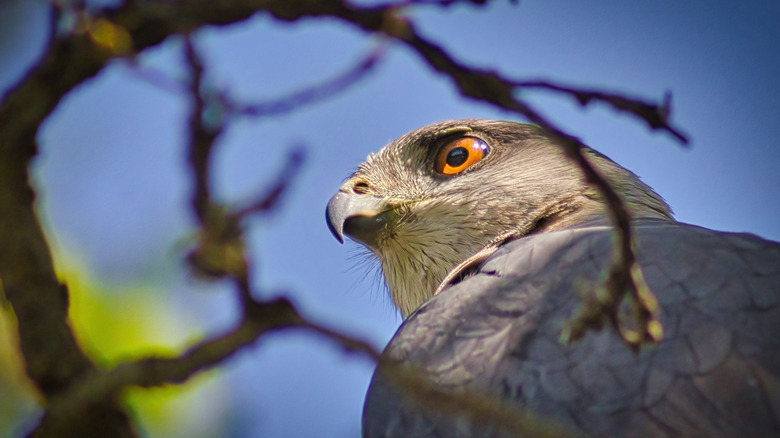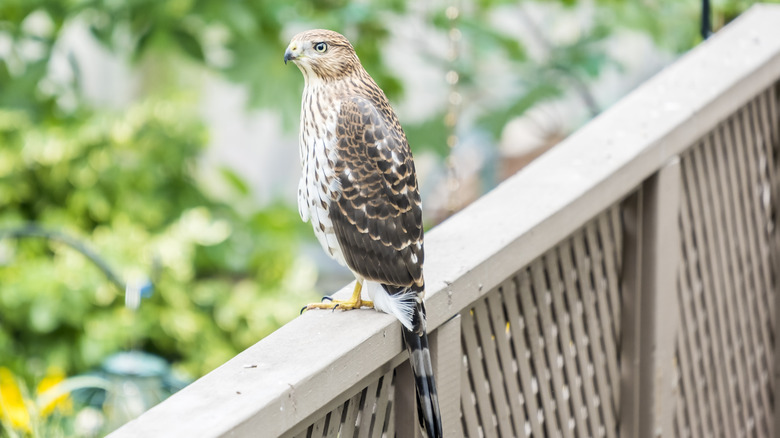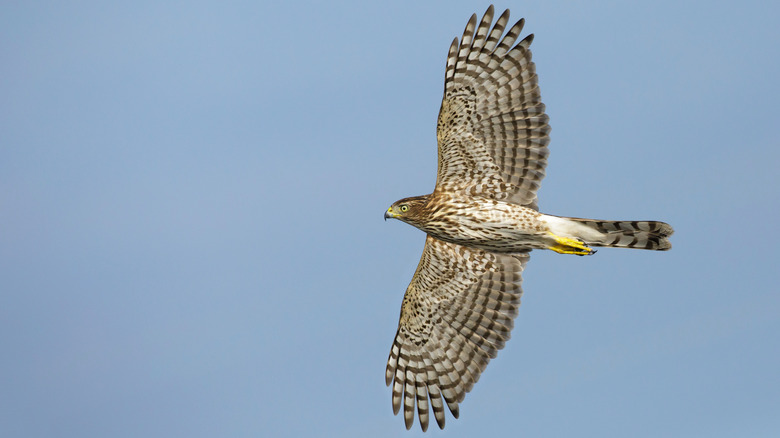You Might Not Be Thrilled To Have A Cooper's Hawk In Your Yard - Here's Why
The Cooper's hawk, with its keen eyes, swift flight, and majestic demeanor, is undeniably a captivating sight. As a medium-sized raptor native to North America, bird enthusiasts often consider themselves lucky to spot this graceful bird of prey. However, while they command admiration, their consistent presence in your yard can come with challenges.
For homeowners who maintain bird feeders to attract and nurture songbirds, a lurking Cooper's hawk can transform this peaceful setting into a hunting ground. The sight of this raptor preying on familiar songbirds can be distressing as it captures prey with its sharp talons and strangles or drowns them. The Cooper's hawk has a unique way of consuming its prey, preferring to eat them only after they die. This contrasts with other raptors that might start consuming their prey while it's still alive. Though this behavior can be unsettling to some, it's important to remember that nature operates by its own set of rules.
Intriguingly, Cooper's hawks predominantly prey on their avian kin. Contrary to what one might expect, smaller birds are often safer from the Cooper's hawk, which primarily targets medium-sized birds. Their preferred prey encompasses a range of species, from European Starlings and Mourning Doves to Rock Pigeons, American Robins, various Jays, and many more, even domestic chickens. However, when these birds are scarce, the adaptable Cooper's hawk can switch its diet, readily raiding nests or hunting mammals like hares, mice, squirrels, and bats. Hence, a backyard is the perfect place for a Cooper's hawk.
Diverse in its diet, daring in its flight, and notably territorial
Indeed, the presence of these hawks can also skew local wildlife populations. Regular predation by Cooper's hawks may result in decreased numbers of certain species, especially those of your frequent bird visitors. However, despite the diversity of wild species in your backyard, the Cooper's hawk's hunting range isn't limited to only them. If you have small pets and Cooper's hawk thinks it can lift them, be cautious. These adept predators aren't averse to trying a different kind of meal.
Yet, there's more to be mindful of. While awe-inspiring in nature, the Cooper's hawk's remarkable agility and inherent confidence in flight can be a liability in urban landscapes. During high-speed pursuits, they might mistake window reflections of trees or the sky as open pathways. Such misjudgments can lead to window collisions, posing significant risks to the hawk and potential damage to your property.
Then there is nesting season, which adds another dimension to our interactions with Cooper's hawks. As they safeguard their nests, these raptors can become exceptionally territorial. Their heightened protectiveness can sometimes cause them to view humans or even larger pets as potential threats, and as a result, they might display aggressive behaviors. While this is an instinct for the bird, it can present a challenging and potentially hazardous situation in residential areas.
Final disturbances and how to prevent such occurrences
The most unpleasant result of a Cooper's hawk in your yard comes upon discovering the aftermath of its hunt. Often evidenced by scattered feathers or remains, these remnants might attract scavengers or disturb those with a sensitive disposition. Fortunately, there are methods to prevent such occurrences.
The easiest and most effective measure when deterring a Cooper's hawk from your backyard is to remove your bird feeder for about a week; the predator should move on to another hunting ground. To reduce window collisions, the following measure would be to install bird-friendly window treatments, such as decals that reflect ultraviolet light or exterior screens. Additionally, to help prey, provide dense shrubs or brush piles for smaller birds to seek shelter and ensure clear escape routes from feeders to these safe spaces. Lastly, always remember to opt for humane deterrent methods, clean up your yard to deter scavengers, and stay informed about local wildlife regulations.
While a blend of wonder and caution is associated with a Cooper's hawk in one's yard, it's crucial to remember that they are integral to our ecosystem. Their presence can indicate that your backyard is a healthy environment, as they thrive in areas where food is abundant and the ecosystem is robust. However, if concerns arise, you can deter these raptors with a few little changes around your backyard. Ultimately, it's about coexisting with nature, understanding its rhythms, and ensuring that humans and wildlife can thrive.


